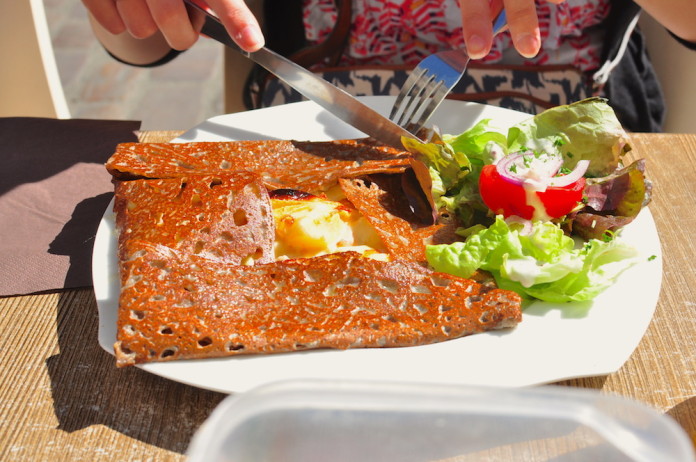We Indonesians love our rendang and worship the culinary miracle called Indomie. But when you’re moving abroad, getting the right food that matches our palate and budget can be tricky. Our contributor, Hanryano, shares the wisdom about food from his time in France, so you don’t end up filling all the space in your suitcase with instant noodles.
Rendang, Opor Ayam, Gulai, Tumpeng.
Those are some local food we long for when moving to other country. Food is part of our culture and we try to carry it with us wherever we go. Unfortunately, not all cities around the world provide necessary ingredients to make Indonesian food we missed dearly. This is why you have to be grateful when moving somewhere with ample supply of Indonesian food, from Tempe to sweet soy sauce to Indonesian instant noodle. Unfortunately, I was faced with the fact that the place I moved into had none of those (yes, not even Indonesian instant noodle). Sooner or later, my ammunition of sweet soy sauce, sambals, and instant seasonings ran out and I had to adapt to whatever it was available locally. So this is some wisdom that I would pass to you based on my experience living somewhere in France that has limited access to Asian food.

Do try (to learn) to cook.
As a person whose cooking experience can be counted with fingers on one hand, I never expected to cook regularly when I was in France. Nonetheless, cooking is an integral part of survival as a student. Pasta was and still is the only food I can cook well, due to its simplicity and undemanding process. Let’s forget about traditional Indonesian food when I can only cook fried rice once in a couple of months due to shortage of necessary seasoning. Thankfully, this is an opportunity to experience new culinary experience. Crêpe is one of the famous delicacy in the city of Rennes. On my first week of arrival, current students took me for a culinary tour around town and it was a really valuable moment to take in what is available and what to avoid.
Do what locals do, eat where locals eat.
As a student, I was considerably frugal when it comes to food, but without leaving room to experience French way of savouring its culinary journey. I made sure that the entire weekdays I will cook or dine in the more-affordable public university canteen and splurge a bit during the weekends. Saving money on dining first and foremost entails finding the proper way to eat (cook or eat out), then looking for the right place to have certain food, and which one to order. Do not get scammed by £7 kebab and instead head to where locals go. Bearing that in mind, cooking is most of the time cheaper, so divide your schedule wisely. You do not necessarily need to eat raclette twice a week to absorb local culture although it would be awesome if you can afford it.

Do not forget to always strike balance between cooking local and Indonesian food. I always keep in mind the quantity and how long the ingredients last. Vegetables and fruits were bought weekly at the local farmer’s market and the rest in cheap supermarket (talk about Lidl). Most of the time, those ingredients were finished just as I expected it to be and I got to move on cooking some Indonesian food with the remaining sambals and instant seasonings I brought from home. It was an indulgence for me. The bottom line is, do not waste anything and try to buy in small quantities for easily-perishable goods. It will save your space as well.
Do your research, especially when you’re traveling.
When winter break arrives, you are probably going to the neighbouring countries: you cannot wait to explore the narrow alleyways and breathtaking cathedral, but sometimes forgot about the iconic food to savour. When you forgot to research where to eat, ask the receptionist where he/she frequently visits instead of the ‘famous’ places. Your wallet and tummy will thank them later. Usually, those places appearing at the top of your search engine after typing ‘food you have to eat in ___’ inflates their price and the fame bestowed upon them was nothing more than glorious days in time gone by. Turning a place to eat into a touristic place is never a good sign.
Halal?
When you are concerned about whether a restaurant serves halal food, I would suggest looking around major train stations. In big European cities, the areas are filled with immigrants and there has to be some restaurants run by a Moslem from whom you can get halal food. On top of that, a few blocks away there are usually streets lined with delicious local food, with really good price. Areas around train stations are considered to be less-elite which defines the inclusiveness of dining experience available. However, this is not the rule of thumb and I would go back referring to locally-frequented restaurants.
Last but not least, embrace the new culinary experience!
The most important part is to let yourself immersed to the food and drinks around and not leaving your taste bud behind in Indonesia as it can cost you a lot. Try slowly accepting different palate when you move somewhere new. You can add typical Indonesian seasoning such as chilli sauce or the famous ‘Boncabe’ to heat up the flavour as I commonly did on my cooking. As time goes by, you will going to go well with different cuisines and just enjoy things the way they are without some additional spices. Good luck on your culinary journey and always keep in mind the nutrition in your food, aside from how it tastes.











